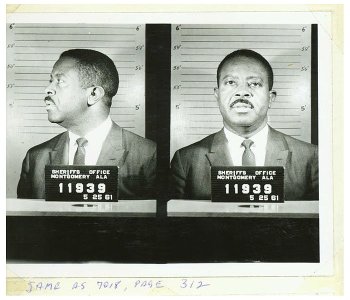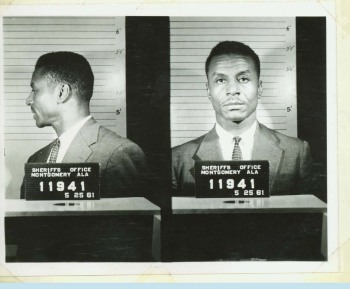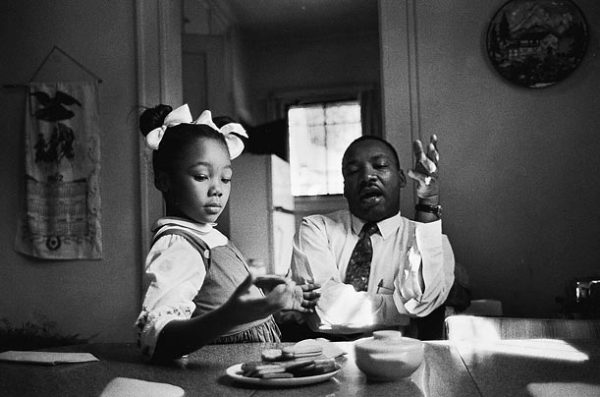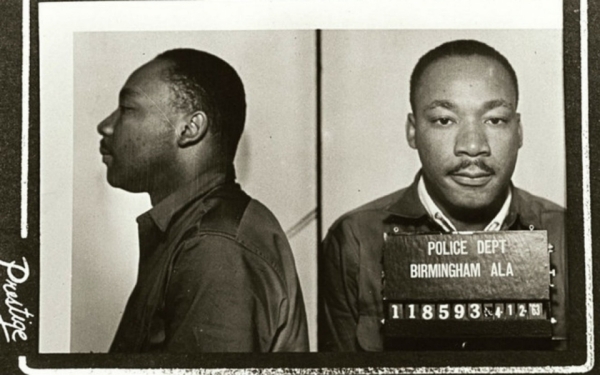PLAYBOY: Dr. King, are your children old enough to be aware of the issues at stake in the civil rights movement, and of your role in it?
MARTIN LUTHER KING: Yes, they are—especially my oldest child, Yolanda. Two years ago, I remember, I returned home after serving one of my terms in the Albany, Georgia, jail, and she asked me, “Daddy, why do you have to go to jail so much?” I told her that I was involved in a struggle to make conditions better for the colored people, and thus for all people. I explained that because things are as they are, someone has to take a stand, that it is necessary for someone to go to jail, because many Southern officials seek to maintain the barriers that have historically been erected to exclude the colored people. I tried to make her understand that someone had to do this to make the world better—for all children. She was only six at that time, but she was already aware of segregation because of an experience that we had had.
PLAYBOY: Would you mind telling us about it?
MARTIN LUTHER KING: Not at all. The family often used to ride with me to the Atlanta airport, and on our way, we always passed Funtown, a sort of miniature Disneyland with mechanical rides and that sort of thing. Yolanda would inevitably say, “I want to go to Funtown,” and I would always evade a direct reply. I really didn’t know how to explain to her why she couldn’t go. Then one day at home, she ran downstairs exclaiming that a TV commercial was urging people to come to Funtown. Then my wife and I had to sit down with her between us and try to explain it. I have won some applause as a speaker, but my tongue twisted and my speech stammered seeking to explain to my six-year-old daughter why the public invitation on television didn’t include her, and others like her. One of the most painful experiences I have ever faced was to see her tears when I told her that Funtown was closed to colored children, for I realized that at that moment the first dark cloud of inferiority had floated into her little mental sky, that at that moment her personality had begun to warp with that first unconscious bitterness toward white people. It was the first time that prejudice based upon skin color had been explained to her. But it was of paramount importance to me that she not grow up bitter. So I told her that although many white people were against her going to Funtown, there were many others who did want colored children to go. It helped somewhat. Pleasantly, word came to me later that Funtown had quietly desegregated, so I took Yolanda. A number of white persons there asked, “Aren’t you Dr. King, and isn’t this your daughter?” I said we were, and she heard them say how glad they were to see us there. MORE
DAILY KOS: I would like to remind everyone exactly what Martin Luther King did, and it wasn’t that he “marched” or gave a great speech. My father told me with a sort of cold fury, “Dr. King ended the terror of living in the south.” Please let this sink in and and take my word and the word of my late father on this. If you are a white person who has always lived in the U.S. and never under a brutal dictatorship, you probably don’t know what my father was talking about. […] It wasn’t that black people had to use a separate drinking fountain or couldn’t sit at lunch counters, or had to sit in the back of the bus. You really must disabuse yourself of this idea. Lunch counters and buses were crucial symbolic planes of struggle that the civil rights movement used to dramatize the issue, but the main suffering in the south did not come from our inability to drink from the same fountain, ride in the front of the bus or eat lunch at Woolworth’s.
It was that white people, mostly white men, occasionally went berserk, and grabbed random black people, usually men, and lynched them. You all know about lynching. But you may forget or not know that white people also randomly beat black people, and the black people could not fight back, for fear of even worse punishment. This constant low level dread of atavistic violence is what kept the system running. It made life miserable, stressful and terrifying for black people. White people also occasionally tried black people, especially black men, for crimes for which they could not conceivably be guilty. With the willing participation of white women, they often accused black men of “assault,” which  could be anything from rape to not taking off one’s hat, to “reckless eyeballing.”
could be anything from rape to not taking off one’s hat, to “reckless eyeballing.”
I remember a huge family reunion one August with my aunts and uncles and cousins gathered around my grandparents’ vast breakfast table laden with food from the farm, and the state troopers drove up to the house with a car full of rifles and shotguns, and everyone went kind of weirdly blank. They put on the masks that black people used back then to not provoke white berserkness. My strong, valiant, self-educated, articulate uncles, whom I adored, became shuffling, Step-N-Fetchits to avoid provoking the white men. Fortunately the troopers were only looking for an escaped convict. Afterward, the women, my aunts, were furious at the humiliating performance of the men, and said so, something that even a child could understand.
The question is, how did Dr. King do this—and of course, he didn’t do it alone. So what did they do? They told us: Whatever you are most afraid of doing vis-a-vis white people, go do it. Go ahead down to city hall and try to register to vote, even if they say no, even if they take your name down. Go ahead sit at that lunch counter. Sue the local school board. All things that most black people would have said back then, without exaggeration, were stark raving insane and would get you killed. If we do it all together, we’ll be okay. They made black people experience the worst of the worst, collectively, that white people could dish out, and discover that it wasn’t that bad. They taught black people how to take a beating—from the southern cops, from police dogs, from fire department hoses. They actually coached young people how to crouch, cover their heads with their arms  and take the beating. They taught people how to go to jail, which terrified most decent people.
and take the beating. They taught people how to go to jail, which terrified most decent people.
And you know what? The worst of the worst, wasn’t that bad. Once people had been beaten, had dogs sicced on them, had fire hoses sprayed on them, and been thrown in jail, you know what happened? These magnificent young black people began singing freedom songs in jail. That, my friends, is what ended the terrorism of the south. Confronting your worst fears, living through it, and breaking out in a deep throated freedom song. The jailers knew they had lost when they beat the crap out of these young Negroes and the jailed, beaten young people began to sing joyously, first in one town then in another. MORE


